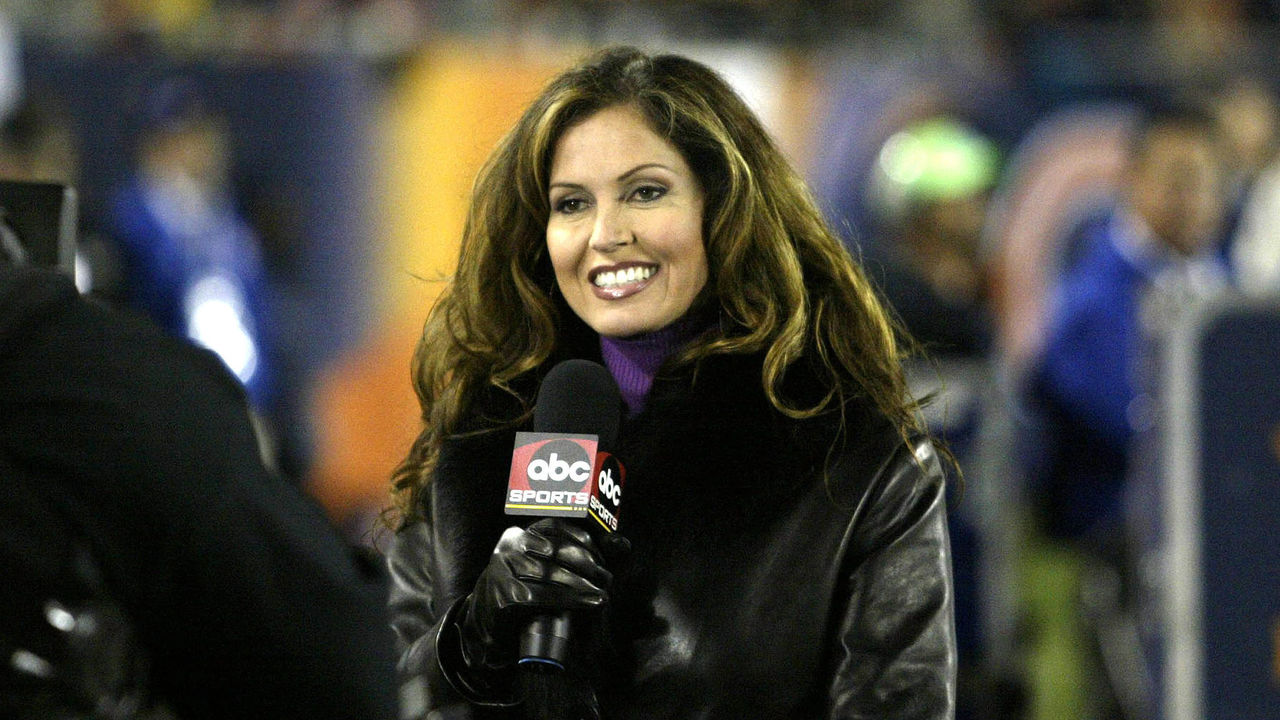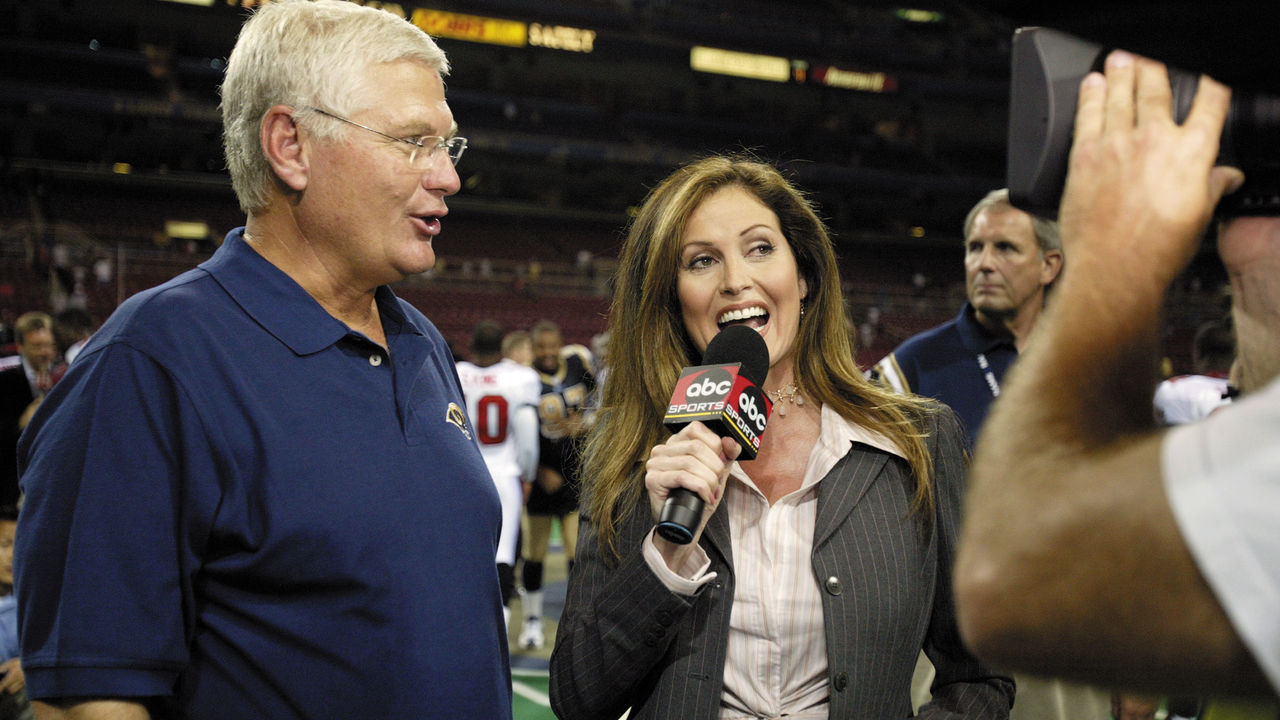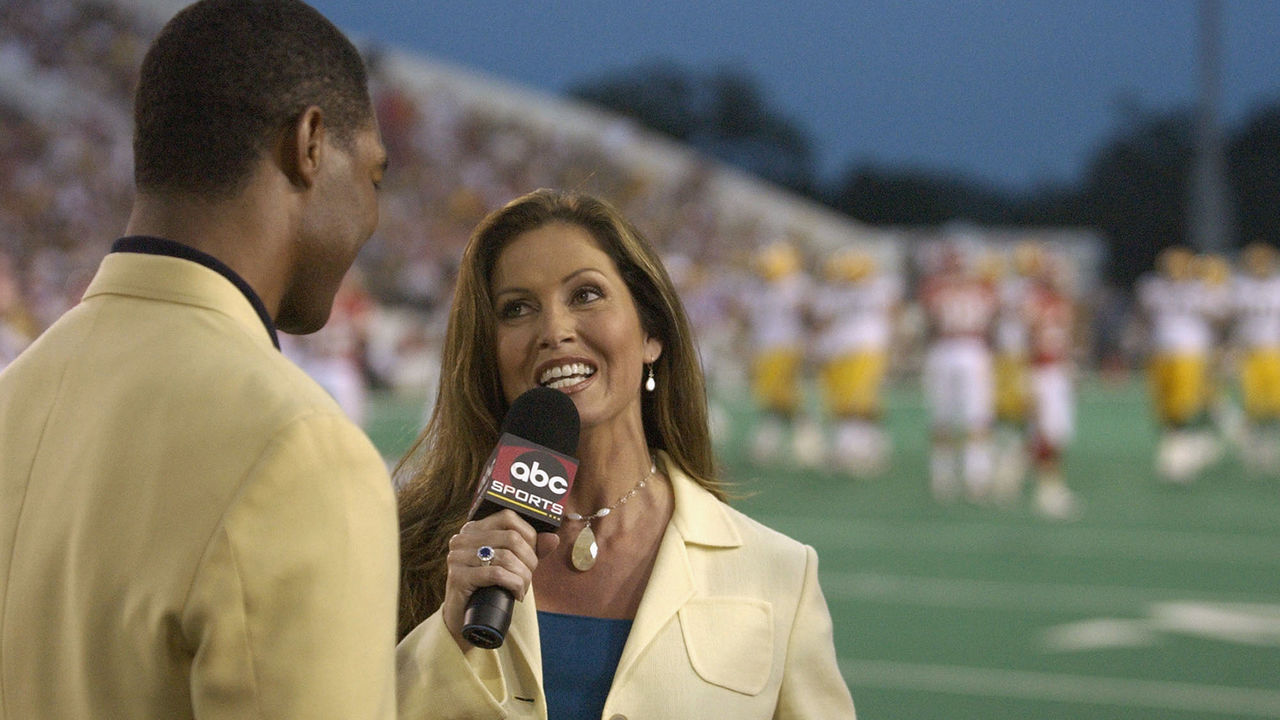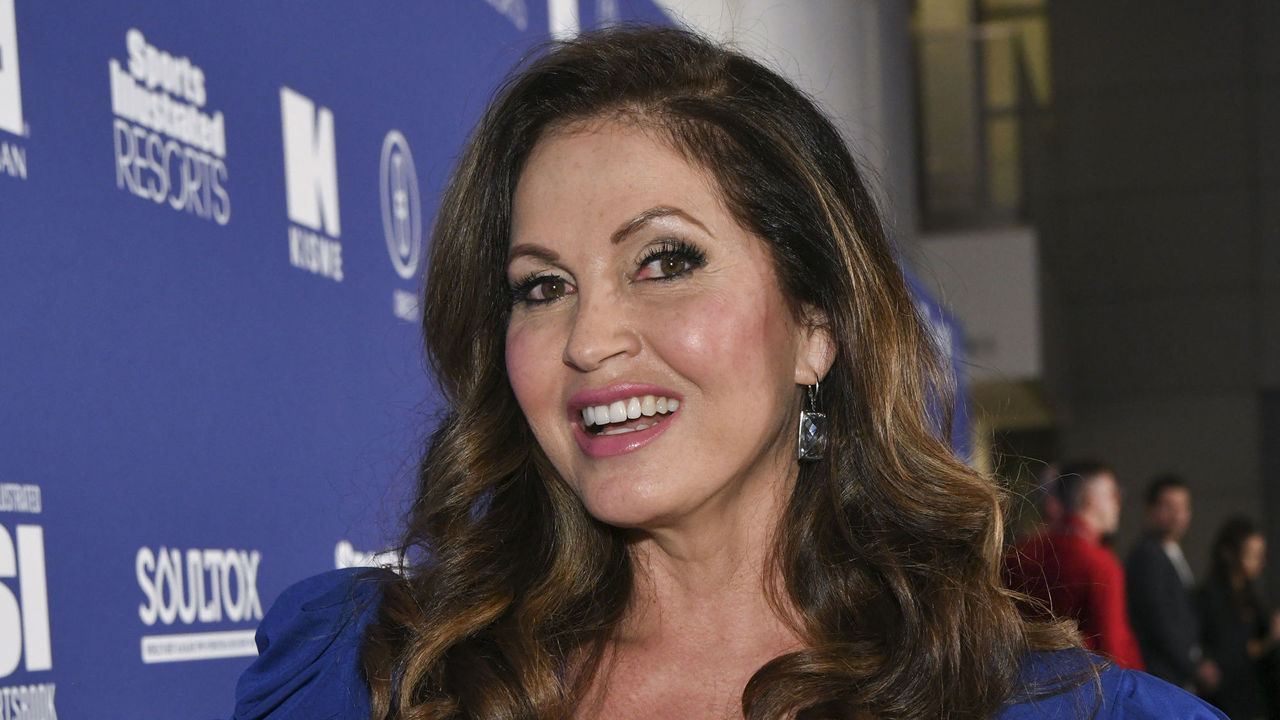Years after Monday Night Football debacle, Lisa Guerrero faces the trauma
Lisa Guerrero's infamously short stint as Monday Night Football's sideline reporter in 2003 came down to the difference between two words: former and current. The flub - referring to a Washington athlete as a former teammate rather than a current one - added fuel to the fire of her detractors and by the season's end played a role in changing her employment status with ABC - from current to former.
It was the defining moment of a season that, for Guerrero, had been a sequence of disappointments. Nabbing a role on what was football's most revered weekly broadcast is usually considered a career pinnacle. But, before the cameras even started rolling, Guerrero began to see signs of a toxic work environment - one where her confidence quickly eroded. The shame of enduring a career flop on a massive stage sent Guerrero into a tailspin. After her firing, she would never return to sports journalism.
But Guerrero did push forward, reinventing herself as a determined investigative reporter responsible for uncovering scams and solving the murder of a 2-year-old child. Nearly 20 years later, she's ready to face the turmoil of that fateful NFL season. She documented the process of coming to terms with her tenure on MNF and her comeback from that in a memoir titled, "Warrior: My Path to Being Brave."
Guerrero spoke to theScore about dusting off those old VHS tapes of her on-air debacle and how she feels about discovering her second act.
This has been edited for length and clarity.
theScore: Your childhood played a major role in the career path you chose. What is your earliest memory of sports?
Guerrero: When I was 8 and my mom was 29, she died of cancer. My dad raised me, and he was a huge sports fan. We've lived in San Diego and our house overlooked Jack Murphy Stadium, which became Qualcomm Stadium. I remember him taking me to Chargers games and thinking that someday I was going to grow up to be the Chargers' quarterback. He didn't tell me I couldn't. Instead, he said, "Well, you better practice." He taught me how to throw a perfect spiral. We could see the stadium lights from our house and I was convinced that was my destiny.
So I think my first real sports moment was not just going to a game to see a specific player or a specific team, it was more of the potential of being this athlete that I wanted to be. ... I wanted to be the next Dan Fouts. Sports filled me with this sense of opportunity and this sense of camaraderie. I connected with my father through the language of sports, which became the platform for me for the next several decades.

The 50th anniversary of your mom's death is coming up. You would have been around the same age she was at the time of her death when you made the career switch from cheerleading to sports broadcasting. Was there a connection between pursuing this new direction and living to an age your mom didn't?
How I viewed my life up until then was that I had a sell-by date, that I was gonna die by the time I was my mom's age. As a child, when you see a parent die like that, you think, "Well, that's probably when I'm gonna die."
When I turned 30, I was so excited, I felt like I had somehow ducked this dark cloud, and then I was able to live the rest of my life. ... I always felt like she didn't get to fulfill her destiny. I felt like I was going to fulfill my destiny and hers. She was an actress and she starred in all of the church plays and she sang. She was a dancer, she was very beautiful, and her life was cut short.
Part of the reason I took her last name was to honor her, to bond with her, to be part of this legacy of this heritage of Chilean women that I'm really proud to be a part of, going back to her mother and grandparents. So I felt definitely when I was 29 that was the time that I kind of came into my own as a Guerrero, which means "warrior."
Throughout the book, you said sports is where you found your belonging. I know you felt like an outsider when you were in high school. As a cheerleader, you felt like an insider. Through the rest of your career, do you feel like you ever found acceptance?
The reason I spend a lot of time in my book writing about the cheerleading experience, as a cheerleader and entertainment director, was that I didn't have a mother. I didn't have sisters. And to this day, I don't have a daughter. So for me, that sisterhood was crucial to me at a time when I needed it - at a time when I didn't know how to wear makeup or how to talk to boys or any of those normal typical things girls learn from their mom. In fact, when I had my period, I thought I was dying. I thought there was something wrong with me. I was screaming. My dad took me to the emergency room and they said, "Sir, your daughter is fine, she's having her first period." Nobody taught me about anything like that. So my female friendships are crucial to me, and the reason why I don't feel like an outsider is that I have this group of women to rely on.

I'm thinking forward to Monday Night Football because it was clear that you really felt like an outsider in that context. Was the feeling of being an outsider further elevated because you had gone through these periods of time when you had felt left out?
Yes, and I write about in the book how I couldn't tell my friends what was happening to me. I was so ashamed and so humiliated by the criticism and the slut-shaming and the verbal abuse and all that I endured that season. It made it impossible for me to share that grief with other people. I didn't want to burden anyone with that, and I didn't want to tell my dad about it because I didn't want him to worry about me. And so they thought I was living this perfect life in a dream job, getting married to this handsome athlete, living in Malibu, living the dream - when in fact, I was in pain every day and it was very lonely.
I grieve for that young woman because she didn't reach out. That's part of why I thought it was so important to write this book. It is a love letter and a cautionary tale to other young women but also a love letter to my younger self: You shouldn't have had to be alone, you shouldn't have had to endure that by yourself. It was devastating.
And at the same time, I look back on it now, knowing that what I went through has made me a stronger person and a more empathetic person, which has driven me in terms of my investigations and what I do now ... you can turn pain into power. But, before you do that, you've gotta face what you went through. I write about it honestly and emotionally because I'm still emotionally connected to it.
What's the point of writing a book if you're not gonna tell the truth and really get to the emotional heart of the story? I don't want somebody to spend $28 on my book and think it's just a series of behind-the-scenes fluff about being a sideline reporter or an actress or an investigative reporter. I want people to really consider what I went through and hopefully find that they can relate in some way to it and learn something through what I went through.
When you watched all the footage of that season, what was the one thing that you wanted to tell that version of yourself?
You did a good job. I was able to look at everything. I was physically unable, emotionally unable to view any of those tapes for almost two decades. When I was writing the book, I had to go back and look at old journals and finally I said, "I've got to look at the tape." A lot of it was on VHS and Beta so I had it transferred and then I looked at my performances. Because my performances were edited into just my performances and not the entire three-hour broadcast, I was able to chronologically go through and I saw something that other people weren't able to see - the improvement and progression every game. I realized, "OK, I made that mistake on the second game, but look, I didn't do that on the third game." My timing was better, my throws were cleaner, my ability to grab the player at the right time when Al (Michaels) was throwing down to me, everything improved every week until the final game.
That game was the famous Brett Favre game where he threw for four touchdowns in the first half. It was a flawless game. I looked at every single hit, I think there were nine or 10, and it was word-perfect. If you just saw that person, you would go, "Oh, she must have been on the show for 20 years. She looks so solid."
But, my younger self wasn't able to absorb that I was improving. That's part of why I'm grieving for this girl, this young woman. I was getting better.

I'm sure it's kind of similar to when you look at old pictures of yourself and - I think we all have this experience - say something like, "I was beautiful. Why was I worried about my weight? I look so good." But you don't really feel that way in the moment.
We're all very hard on ourselves. In my case, what made it worse was that other people were also very hard on me. I like to call it the culture of cruelty that runs throughout sports, whether it was the sports radio guys or sports columnists, colleagues, sports fans, call-in talk radio, all of that stuff is very cruel, and of course, now we see it in social media.
It's kind of accepted in the world of sports to be vicious, to be misogynistic or racist or hurtful or just mean-spirited. That runs through sports and has always been accepted, and I am pushing back on that now. Part of why I'm writing this is to say, "No, it's not acceptable." I spoke to Bob Costas when I was writing the book to get his advice on some things, and he said to me, "You know, I had really good producers that yelled at me too back in the day." I thought to myself, "That's not acceptable to anybody in any work environment, I don't care what you do for a living."
You shouldn't be yelled at or demeaned. You shouldn't be shamed. But, back then it was acceptable and it hurt me deeply. It almost cost me my life. It cost me a life because I had a miscarriage. Then, the following year it almost cost me my life.
I don't know if you saw Michele Tafoya's rant on YouTube. She seemed to take the approach that this is just kind of standard and people have to deal with it. It sounds like you take the complete opposite approach.
I do, I've never met her, and I am so grateful that she didn't have the experience that I had. What I endured was traumatic and it was real and it was painful. I wouldn't want anybody to experience that.
Although we've evolved in terms of women in sports, I think as long as we keep judging other women and saying, "You didn't do it the way I did it, or you should have come up this way, or your experience isn't validated because it wasn't my experience," that hurts us all. That is damaging to all of us. We all have unique experiences and backgrounds, we all bring to the table different assets and different skill sets. To somehow describe somebody else's experience as less than or invalid because it's not the way you experienced it is so damaging. It's really sad.
The big mistake that seems to haunt you was just one word: former teammate versus current. Did it look like as big of a mistake when you watched the tapes?
It doesn't seem like a big deal now, but it couldn't have been more crushing at the time. It was basically the excuse that everybody had to say that I was horrible and that I was just a bimbo and I was just a model and just a cheerleader. It was an opportunity for everybody to say that I was just as bad as they had been writing about. It was so damaging and thank God I do have the tapes and I could see the progression. Ultimately, that job was not the right job for me. I like to say that football wasn't the last line on my resume. Thank God I went on to do other work that I'm super proud of.
But at the time it was devastating. Those lessons that I learned, having endured that and enjoyed that criticism has helped me to be more empathetic to the people I interview today.

Let's talk about the reinvention because that's something that not a lot of people can do. And it's something that a lot of people have to figure out how to do, especially in today's age, with cancel culture, slut-shaming and social media bullying.
What my dad shared with me was a really important thought. He said, "You think of yourself as this sports personality, and yes, that's what you've done since you were 8. We bonded through sports. But at the end of the day, there are people in this world that don't know who's playing in the Super Bowl, they don't care about sports. You're a good reporter, and maybe your efforts are better spent on something else rather than somebody's groin injury on a sideline." That perspective started to shift my change in attitude. I'm not saying it happened overnight because it took two full years where I was still depressed. It was difficult for me to get out of bed. I couldn't watch any sports at all for two straight years.
I got therapy, very importantly. Interestingly, that therapist I had seen during some of these crucial incidents just reached out to me. She just called me and said she heard about my book, and she was so happy that I was healthy.
What I did was just shift that energy and that spotlight to a different group of people who needed me more. Frankly, those are survivors and victims of scams and crime and abuse. Now, I get to tell their stories. I'm the same reporter with the same skill set. I didn't take a class to get better in the interim between Monday Night Football and "Inside Edition," I just looked at myself differently and I became a better storyteller. Now, 600 investigations later, I'm proud to say that I did the hard work of rebranding myself.
You've had so many successes at "Inside Edition," and you did a lot of work that you're really proud of. But in your book, you said running into Erin Andrews in a restaurant was a remarkable moment because you felt you were going to be remembered only as a low point on Monday Night Football, and Andrews heaped a lot of praise on you. Has the way you see yourself shifted?
That's the reason I wrote my book, to really examine what happened, what led up to that season, what I learned from it going forward, and how other people can learn from what I went through.
I can forgive myself for the mistake I made or the lapses in judgment. To have young women say, "I can relate to this," or, "this is still happening to me," has impacted me so emotionally.
Do you watch sports anymore? Is that still part of your connection with your dad?
I do. Now, I'm a huge sports fan again. Yes, it took me a minute. I'm not gonna lie. But yeah, I enjoy sports now. I love going to a Dodgers game, just having a beer and a hot dog and cheering on my teams.
My dad and I did just recently watch NFL games together. We'll call each other after games and say, "Can you believe that call? What about that injury?"
What would your mom say about the book?
I think she would be incredibly proud. I know she is, I don't believe she's actually gone. I think her spirit still lives within me and around me.
I think she would be proud of the name of the book. Guerrero means "warrior." The book is named for her. I especially think she would be just proud of me for writing it, for having the strength to go back and to think about these things. I feel like I've reclaimed her legacy. I feel like I've reclaimed my name. I say at the end of the book that I'm a warrior, I feel like that now.
Jolene Latimer is a feature writer and video host at theScore.